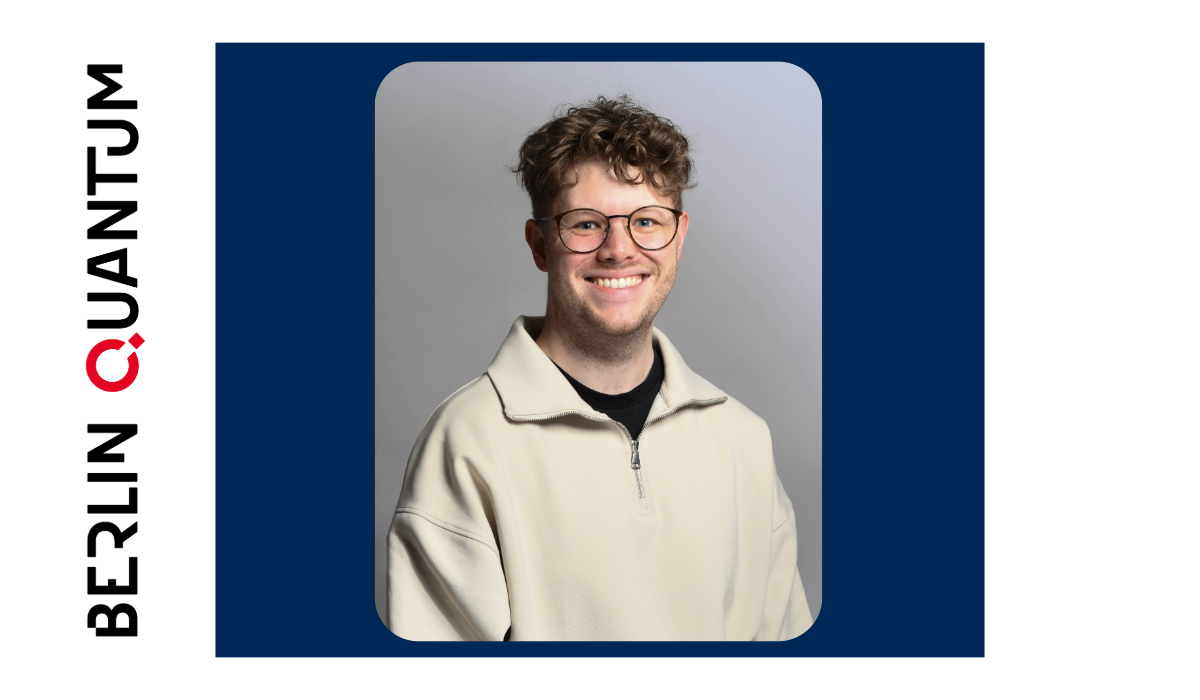In this interview, quantum physicist and BERLIN QUANTUM Fellow, Tom Weber, shares his journey into quantum computing and simulation, and how he’s exploring the use of quantum noise to model open quantum systems. Based in Berlin and supported by BERLIN QUANTUM, Tom reflects on the collaborative research environment, the value of interdisciplinary exchange, and the exciting future of scalable quantum algorithms.
What inspired you to pursue a career in quantum physics?
The world of quantum physics seems completely different from the worlds of our everyday lives, and I always wanted to understand how the mechanisms on the smallest scale lead to the circumstances we observe. The potential of using quantum computers to enhance our knowledge of quantum physics has fascinated me for several years now.
Why did you choose to conduct your research in Berlin?
During my time as a PhD student in Hamburg, I already worked together with different people from Berlin. This led to a collaboration as part of a project within the Einstein Research Unit in Berlin, where I worked as a postdoc for a little more than a year. It was clear that we wanted to continue our work, and therefore I applied for one of the BQ projects. Summarising, it was my very positive experience with the scientific environment in and around Berlin that caused me to come to Berlin myself.
What advantages does Berlin offer for quantum physics research compared to other cities or countries?
One big advantage is the diversity of research institutions in the area of quantum physics and the effort to connect them. Many excellent people work in a variety of directions, and organisations such as BERLIN QUANTUM support the exchange and collaboration between these people very well.
Can you tell us about a current project or experiment you are working on?
Various approaches exist for using quantum computers to simulate other systems of interest. Since current devices are subject to quantum noise, it is only natural to consider so-called open quantum systems as the targets of simulation algorithms. These consist of the actual system we are interested in as well as the environment it interacts with. We are currently investigating different ideas to utilise the noise of a quantum computer to mimic this environment and its influence on what we want to observe.
How does BERLIN QUANTUM and the Berlin research landscape support your work, and which resources are particularly helpful?
For me, the most valuable resource is the connection to other research institutions. Most of the people working on quantum computing did not initially start their careers as researchers in that field. Instead, they also bring their knowledge and expertise in various other directions of physics, computer science, or mathematics. In my experience, this diversity leads to very creative new ways to think about quantum physics.
What role does collaboration with other scientists and institutions in Berlin play in your research?
For our project, collaboration with other scientists plays a significant role. We are in constant exchange with other institutes such as DESY in Zeuthen, leading to valuable discussions and the creation of new project ideas.
How does living in Berlin influence your personal and professional development?
In a city like Berlin, you experience new things every day, which makes it very hard to get stuck in the same old routines. I have the feeling that this also makes my work much more versatile, and I can use the new impulses from my personal life, but also from meeting new researchers, as a source for new ideas.
In your opinion, what are the most exciting developments or trends in quantum physics that we can expect in the coming years?
Since I am working on quantum computing and quantum simulation, the most interesting developments are those that hint towards the possibility of running large-scale quantum algorithms. Therefore, advances in scalable quantum hardware and error correction are always nice to see, and I think there are more to come in the future. However, new ideas regarding advantageous quantum algorithms would be the most exciting to me.
What advice would you give to young scientists who aspire to a career in quantum physics and might consider coming to Berlin?
Spend quite some time learning about all the different research areas of the quantum physicists in Berlin. There are so many interesting ideas and projects, and finding one that suits you can make your work much more fun. Also, talk to the people because your team and your work environment might be just as important as your actual research topic.
More information.

